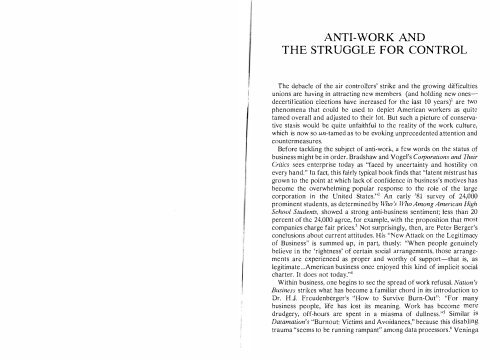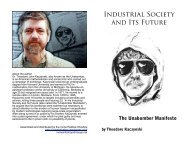CONTENTS - ouroboros ponderosa
CONTENTS - ouroboros ponderosa
CONTENTS - ouroboros ponderosa
Create successful ePaper yourself
Turn your PDF publications into a flip-book with our unique Google optimized e-Paper software.
,<br />
I<br />
i<br />
I<br />
I<br />
I<br />
ANTI-WORK AND<br />
THE STRUGGLE FOR CONTROL<br />
The debacle of the air controllers' strike and the growing difficulties<br />
unions are having in attracting new members (and holding new ones<br />
decertitication elections havc increased for the last 10 years)' are two<br />
phenomena that could be used to depict American workers as quitc<br />
tamed overall and adjusted to their lot. But such a picture of conserva<br />
tive stasis would be quite unfaithful to the reality of the work culture,<br />
which is now so un-tamed as to be evoking unprecedented attention and<br />
countermeasures.<br />
Before tackling the subject of anti-work, a few words on the status of<br />
business might be in order. Bradshaw and Vogel's Corporations and 1heir<br />
Critics sees enterprise today as "faced by uncertainty and hostility on<br />
every hand." In fact, this fairly typical book finds that "latent mistrust has<br />
grown to the point at which lack of confidence in business's motives has<br />
become the overwhelming popular response to the role of the large<br />
corporation in the United States.'" An early '81 survey of 24,000<br />
prominent students, as determined by Who 's Who Among American High<br />
School Students, showed a strong anti-business sentiment; less than 20<br />
percent of the 24,000 agrce, for example, with the proposition that most<br />
companies charge fair prices.' Not surprisingly, then, are Peter Berger's<br />
conclusions about current attitudes. His "New Attack on the Legitimacy<br />
of Business" is summed up, in part, thusly: "When people gcnuinely<br />
believe in the 'rightness' of certain social arrangements, those arrange<br />
ments arc experienced as proper and worthy of support-that is, as<br />
legitimate .. .American business once enjoyed this kind of implicit social<br />
charter. It does not today.'"<br />
Within business, one begins to sec the spread of work refusal. Nation '5<br />
Business strikes what has become a familiar chord in its introduction to<br />
Dr. H.J. Frcudenbcrger's "How to Survive Burn-Out": "For many<br />
husiness people, life has lost its meaning. Work has become mere<br />
drudgery, off-hours are spent in a miasma of dullness."s Similar is<br />
Datamation's "Burnout: Victims and Avoidances," because this disabJing<br />
trauma "secms to be running rampant" among data processors ' Veninga






